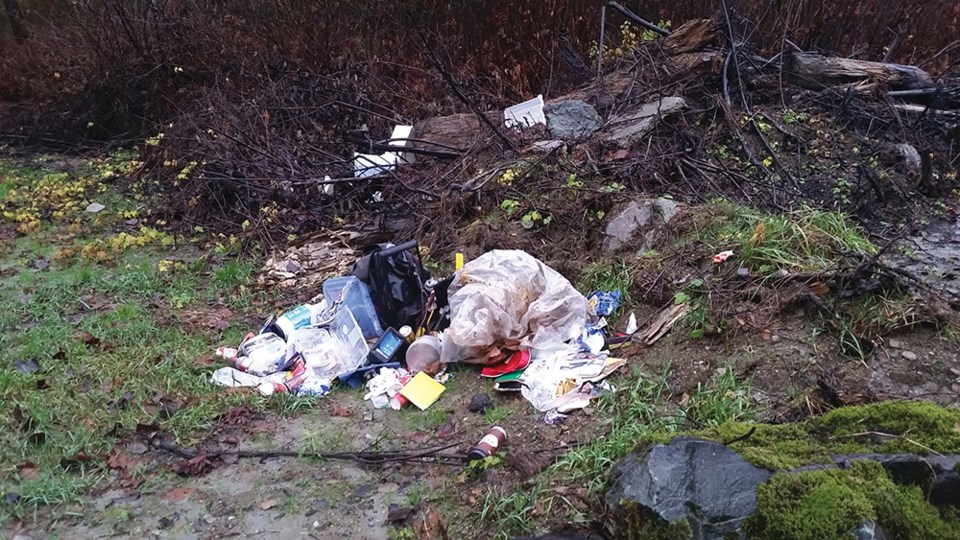He got tired of seeing it and wanted to do something about it.
Former Squamish resident Craig Cherlet recently created the Sea to Sky Illegal Garbage Dumping Map with Google Maps.
“We used to go up into the Highlands just behind the university, and that was one of the first places we saw tons of dumping… from couches and bags of garbage to regular old building materials to yard waste,” Cherlet recalled. “I thought ‘I am going to throw a map together.’”
He hopes people who see illegal dumping in the backcountry will add those sites to the map so that it can be collected. (The map can be found at bit.ly/2giolhS.)
The local off-road community may just be the ones to fill that call.
Across the province, including in the Sea to Sky Corridor, members of the Four Wheel Drive Association of B.C. make it their business to head out and pick up the trash left in the wilderness by others. They have been doing it since the 1970s.
“It is one of our core values: To mitigate the impact of urban environments in the backcountry,” said Kim Reeves, president of the association.
As populations grow, more pressure is put on forest service roads, he said, adding the problem is certainly not unique to the Sea to Sky Corridor.
Squamish Nation officials have to deal with illegal dumping on their reserves and territory as well.
“This has put an incredible strain on all private industry managers, such as our Sqomish Forestry Company and other Nation and government agencies responsible for safety and enforcement in the backcountry,” said Squamish Nation spokesperson and Coun. Chris Lewis.
“Of particular concern to the Nation is unsanctioned camping in non-camping areas which results in large amounts of garbage being left behind. This has put an additional strain on Nation and other government resources to keep the backcountry clean and pristine.”
Five main types of garbage are found in the local backcountry, Reeves said, naming off residential and construction waste, partying mess, grow operation waste – including bags of residual clippings – and shooting waste, such as shotgun shells and targets.
Reeves said it should be free to drop off goods at the landfill and transfer stations.
“Our waste is driven by our consumption,” he said. “Currently there is a disincentive to dispose of it properly in the form of fees and charges.”
Reeves said the cost should be spread across the tax and development base rather than charged at the point of dumping.
“Paid through a consumption tax… so those who consume more pay more.”
Reeves points to new rules around drywall that he said leads to illegal dumping. The Squamish Landfill and, as of Nov. 1, the Whistler transfer station no longer accept drywall that may contain asbestos. If it can’t be identified, the material is assumed to be asbestos and treated as such with special WorkSafeBC rules and expenses, Reeves noted.
“That could be any drywall that one, you can’t read the tag and two, the tag is from pre-1990,” Reeves said. “There’s a higher disincentive to go and put it in the proper channel because it costs a lot more money, but it still exists. It costs a whole lot more money for the volunteers to go into the backcountry and put in the sweat, walking down these steep ravines and pulling all of this garbage out.”
The Squamish Landfill Public Depot does accept and recycle drywall that does not contain asbestos at a tipping fee of $290 per tonne.
Mayor Patricia Heintzman said, in principle, she agrees with Reeves that an upfront pay system would be more effective than charges at the landfill.
“It is out of local government’s hands,” she said.
“It is in the hands of provincial government to set up those systems and they have, slowly.”
Heintzman pointed to the provincial Extended Producer Responsibility program where producers pay upfront for the disposal of some goods, such as for tires, batteries and paint.
In the meantime, municipalities have to recover their costs, she said.
District of Squamish operations staff will pick up items illegally dumped on its property, but not from private land.
To report illegal dumping on district land, call 604-815-6868 (604-815-4040 after hours if it is an emergency).
For dumping on Squamish Nation lands call 604-892-5116 or 1-877-952-7277.



